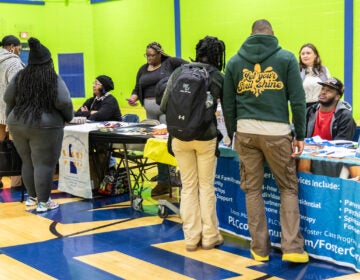At Rutgers job fair, college grads weigh risks of entering uncertain job market or going back to school
Rutgers University was overflowing with recent and future college graduates dressed in their best business attire, resumes in hand, eager to shake hands with company recruiters at the 25th Annual Collegiate Career Day, held recently on the New Brunswick campus.
Over 160 private and public companies and organizations filled the Brower Commons and Student Center on College Ave., filling their tables with pens, water bottles, tote bags and candy. Lines formed at lucrative companies like Johnson & Johnson, Bristol-Myers Squibb Company and the U.S. Federal Bureau of Investigation.
Recent grads are faced with making tough decisions in light of the struggling economy and high unemployment rates; many decisions they did not expect to be making when they started college.
“Everyone was like, by the time you get out, the job market will be better. Don’t worry about it. Just do what you like. No one was being practical,” Janeille Lewis, said. Lewis, 23, graduated with a bachelor’s degree in Spanish and minors in Anthropology and International Studies from Ramapo College this spring.
Entering uncertain job market or going back to school
Recent grads are weighing the benefits and costs of either continuing their education and avoiding the uncertain job market or heading straight into a market that is increasingly competitive and often demands years of work experience new graduates don’t have.
Lewis plans on eventually attending graduate school, but for now she is looking to enter the job market.
“I need to make sure I’m working so I can help my family. That’s one of the reasons why I wanted to work and not go straight into grad school.” Lewis says the recruiters she met at the fair informed her they were looking for candidates with three to four years of experience.
“When you look on the job sites, it says one to two years of experience, some five years of experience. We virtually have no experience in the job market. Entry-level positions want a year or two of experience and you’ve only done three months of an internship. It’s very hard,” 22-year-old Ilias Gutu said. Gutu also graduated from Ramapo College with a bachelor’s in Accounting in the spring.
Latisha Fitzgerald, 22, and Althea Garçon, 24, decided there is no other option but graduate school. Both received bachelor’s degrees in public health from Rutgers University in 2011, but were unable to find steady work in their field after graduating.
Garçon said she woke up feeling positive about the career fair, but left feeling defeated.
“Everyone said with my major there would be lots of opportunities, then I get out there and not a lot of people are looking unless you have your masters,” Garçon said.
Fitzgerald left the fair equally disappointed. “Everyone there is looking for interns and volunteers. At this point you cannot do that. If we want to go back for our masters, you need work experience also, and then you have to pay for this kind of education.”
Many current college students attended the fair seeking internship opportunities and to get a feel for the job market they face after graduating.
“I was looking to hand out my resume and talk to as many people as I can; try to get some cards, try to get my name out there,” 20-year-old Rugved Deshpande said.
Deshpande is a junior English major at Rutgers and anticipates he will have a difficult time finding a job after graduation, so he has already decided to pursue his master’s degree.
“That’s a tough decision because not a lot of jobs are out there right now, so to risk getting there and being rejected and staying home for a year as opposed to that year you could be studying and working towards something — it’s tough. I’d rather go with the master’s degree because maybe once I get out, lets hope the economy is better,” he said.
A college education is still an advantage
Regardless of whether four-year graduates decide to dive into the job market or avoid it for a few more years, a college education is still valuable in the current economic climate.
According to the US Bureau of Labor Statistics, the seasonally-adjusted unemployment rate in May for people 25-years-old and older who hold a bachelor’s degree or higher was 3.9%, where as the same population having earned only a high school diploma was more than double at 8.1%.
Despite all the woes recent grads face, most do not regret attending college.
“Definitely going to college and having a college degree gives you more options. These options we have now, we wouldn’t have been given the chance,” Lewis said.
WHYY is your source for fact-based, in-depth journalism and information. As a nonprofit organization, we rely on financial support from readers like you. Please give today.




